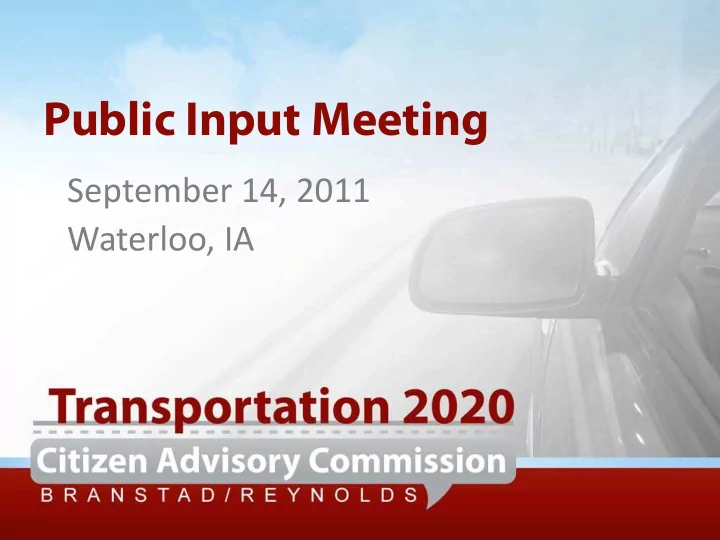

Public Input Meeting September 14, 2011 Waterloo, IA
Meeting Format • Introduction • Background • Public Input 2
Road System Studies/Initiatives • 2002 ad hoc city/county/state initiative – identified recommendations to increase efficiency (adopted by legislature) • 2006 Road Use Tax Fund (RUTF) Study • 2008 TIME-21 Funding Analysis • 2011 Road Use Tax Fund Study – underway 3
Actions by Individual Agencies • Counties – reduced staff by approximately 300 in last ten years • DOT – Reduced staff by 750 since 2002 – Eliminated 39 field offices/garages – Reduced number of vehicles in the fleet – Annual savings - $35 million 4
2011 RUTF Study • Per Code of Iowa, the DOT is required to review current revenue levels and projected construction and maintenance needs. • The report may include funding level recommendations. • Shall also evaluate alternative funding mechanisms. • Due every five years with first report due December 31, 2011. 5
Governor’s Transportation 2020 Citizen Advisory Commission (CAC) • Designated by Governor Branstad March of 2011 • Tasks – Assist the Iowa Department of Transportation (DOT) in completing its legislatively mandated review of road needs and funding. – Seek public input conditions of Iowa’s roadway system, the importance of roads to Iowans and funding options. 6
Governor’s Transportation 2020 Citizen Advisory Commission (CAC) • Nancy Richardson – Coralville Allan Thoms – Cedar Rapids (Co-Chair) (Co-Chair) • Scott Cirksena – Clive Jeff Corkery – Peosta • Catherine Dunn – Dubuque Geri Huser – Altoona • Jim Kersten – Fort Dodge Lindsey Larson – Jefferson Ann Trimble Ray – Early Rose Mitchell – West Des Moines • Larry Winum – Glenwood Dan Wiedemeier – Burlington • The following legislators are ex-officio members of the commission: Chair/Ranking Member of Senate Chair/Ranking Member of House Transportation Transportation Sen. Tom Rielly (D-Oskaloosa) • Rep. David Tjepkes (R-Gowrie) Sen. Tim Kapucian (R-Keystone) • Rep. Jim Lykam (D-Davenport) 7
Iowa’s Public Roadway System Jurisdiction Length (miles) # of Bridges State 9,403 4,092 County 89,911 19,386 City 14,804 1,111 Other 623 210 Total 114,740 24,799 8
Evaluation of Recent Trends • Iowa’s infrastructure rankings continue to drop 2009 Ranking 2010 Ranking Category (based on 2007 data) (based on 2008 data) Change Rural Interstate Condition* 34th 38th -4 Urban Interstate Condition* 43rd 43rd 0 Rural Arterial Condition* 43rd 46th -3 Deficient Bridges 30th 34th -4 Source: Annual Report on the Performance of State Highway Systems , Reason Foundation, David T. Hartgen, Ph.D., P.E., and Ravi K. Karanam, December 2009 and September 2010 * Based on road roughness 9
10
State Road Funding State Constitution FY 2011 Funding Source Percent of Total Requires Funds be (estimated) Used for Roads? Fuel Tax $430 million 36 percent Yes Annual Registration $470 million 39 percent Yes Fee Fee for New $240 million 20 percent Yes Registration Other* $70 million 5 percent No Total $1.21 billion * Driver’s license fees, title fees, trailer registration fees, and other miscellaneous fees. 11
History of RUTF Revenue $1,300 $1,200 $1,100 Millions $1,000 $900 $800 $700 $600 $500 1997 1998 1999 2000 2001 2002 2003 2004 2005 2006 2007 2008 2009 2010 Actual Receipts Constant 1997 Dollars 12
Challenges • “Perfect Storm” – Large and aging system – Increasing demands – Flattening revenue – Increasing construction cost inflation rate • Impact of severe weather – Immediate damage to infrastructure – Deferred maintenance due to shift in operational activities to address weather impacts. – Unquantifiable loss of useful life due to underlying damage to infrastructure 13
14
15
Local Challenges • At-grade intersections on US 218 • University Avenue corridor needs between Waterloo and Cedar Falls • The six county region has 1,961 bridges and nearly 35 percent are below minimum standards • Larger and heavier ag equipment is negatively impacting infrastructure 16
Evaluation of Recent Trends • Continued impacts on the system due to severe weather. • Condition of the system continues to deteriorate. • Short-term growth in revenue to TIME-21 grandfathering provisions. • Overall traffic and truck traffic has begun to grow again. • Construction costs rising (5.4 percent through the second quarter of CY 2011). • Less federal funding likely. • Higher vehicle fuel economy cutting fuel tax revenues. 17
Evaluation of Critical Needs • Forecast revenues will fall short of meeting critical funding needs by $215 million per year • Impacts of critical funding shortfall – Increased numbers of bridges with weight restrictions and bridge closures – Deteriorating conditions across the system – including high-level roads critical to movement of goods and people – Increased costs to transportation providers and users – Potential economic losses to the state of Iowa 18
Funding Options (existing) • Fuel tax • Annual registration fee • Fee for new registration • Driver’s license fee 19
Funding Options (potential) • Sales tax on fuel • Severance tax on ethanol • Per-mile tax • Transportation Improvement District • Tolling • Development impact fees • Bonding (financing mechanism) • Public private partnerships (financing mechanism) • Container tax • Imported oil tax • Tire tax on light-duty vehicles • Alternative fuel/high fuel efficiency vehicle tax 20
Now it’s your turn! • How is Iowa’s road system important to you? • What are your views regarding the condition of Iowa’s public road system? Is the condition having an impact on you today? • If you feel additional funding is needed, what mechanisms ought to be considered? • If you don’t feel additional funding is needed, what ought to be done differently? • How do you feel road funds should be utilized? (e.g. capacity projects, pavement preservation, bridge preservation, new roads, etc.) 21
More Information • www.iowadot.gov/transportation2020 • Additional comments or questions can be submitted through the Transportation 2020 website – click on “Contact us” button along left side of website 22
Recommend
More recommend